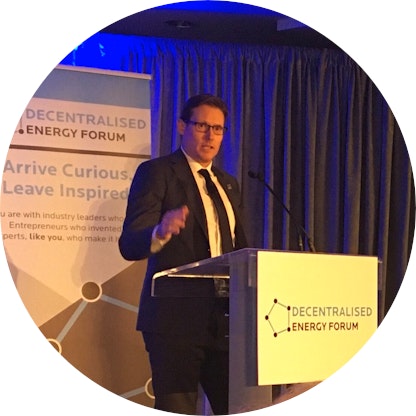Ground zero for soft energy pathway
Islands are on the front line of climate change, evidenced by the recent swath of hurricanes that have wiped out electricity systems across the Caribbean. But island countries are not waiting for the inevitable. Many are moving to decentralised renewable resources and testing storage technologies and micro-grid solutions, says Justin Locke, Senior Director at the Rocky Mountain Institute
Insights gleaned from islands today can help shape a softer energy pathway globally tomorrow
In 1976, the Rocky Mountain Institute’s co-founder Amory Lovins wrote Energy Strategy: The Road Not Taken?, outlining his hypothesis for a soft energy pathway for global security. In an era defined by large, centralised, mainly fossil-fuelled electricity generation, with power transmitted over hundreds of miles, Amory concluded a soft (decentralised) pathway would be cheaper and more secure. Over 40 years later, this hypothesis is being proven at scale. With geo-political divisions growing in the global oil economy and the impacts of climate change intensifying, countries, states, cities and communities are acknowledging that a more decentralised energy generation system is safer and more resilient to a rapidly changing political and environmental context. Nowhere is the business case clearer and the need to transition to a soft pathway more urgent than in island communities. Islands have some of the highest electricity costs in the world combined with excellent renewables resources. They are also highly exposed to disruption from natural hazards, both of which are inherently linked to their centralised, fossil fuel electricity systems. As a result, islands now find themselves at ground zero for the soft energy pathway…whether they wanted it or not. California, while geographically completely different from the Caribbean, shares the same electricity system architecture of centralised power generation with transmission and distribution networks spreading hundreds of miles. Due to windy, dry weather that increased the risk of fire, in autumn 2019 power firm PG&E had to shut down the grid to avoid any chance of a power-line accident such as that which sparked a deadly wildfire in the small town of Paradise less than a year ago, leaving millions of homes and business without power for long periods. Ultimately, these efforts were futile in preventing fires that still burn. Whether it is high wind, floods or fires, these catastrophic events highlight the vulnerability of our world. Nowhere is this more evident than in our grids since electricity is the lifeblood of an economy. If a storm shuts down a central power plant or knocks down a transmission line, populations, services and businesses go dark, and these lines are expensive to rebuild. As the world saw in New York after Super Storm Sandy and in Puerto Rico after Hurricane Maria, diesel fuel shipments for backup generation can be limited and unreliable, particularly if ports and roads are compromised. And disruptions to power supply can put out of action health facilities, water infrastructure, telecommunications, community service organisations, shelters, businesses, first responders, schools and other critical facilities. Cost reductions in the last decade for solar photovoltaic and the recent plunging costs of battery storage mean decentralised, renewable-based micro-grids are competitive with the electricity grid. The Rocky Mountain Institute works in the Caribbean to ensure investments support optimal economic solutions with proper planning and sound project preparation, and de-risk and aggregate projects through competitive procurement. As a result, we are seeing the proliferation of distributed solar-plus-storage micro-grids at critical facilities that reduce economic losses and save lives during and after major storms. From a broader perspective, we are strategically leveraging micro-grids around critical facilities to open the distributed market. This approach forces the regulator to think about distributed generation at scale, and utilities and the private sector to innovate around business models to make this happen. Consultancy Wood Mackenzie sees the Caribbean as one of the most active micro-grid markets in the world and expects it to more than double in size by late 2024. Through our work in the Caribbean, we have learnt that building twenty-first century energy systems to make the region more resilient to future storms needs to be based around three criteria. First, you need a plan that enables you to get from where you are today to where you want to go. It is critical that all stakeholders (government, utility, regulator and the public) align around a core vision and develop this plan together. Moving from a centralised to a decentralised energy supply is very personal in a small community and everyone should have a say in how they want the world around them to look. This plan should be based on a strong understanding of the technical parameters of the electrical grid as well as the underlying economics of the electricity sector and chart the least cost and most resilient pathway. Secondly, stakeholders need to act .
Whether it is a big step or a baby step, it is critical to take the action required to move the transition process forward. Most importantly, the utility must demonstrate leadership. The harder the utility fights against change, the more difficult the inevitable transition will be — for them and the sector as a whole. Thirdly, and most importantly, it is critical to collaborate with all stakeholders, outside knowledge providers and other communities going through the same journey. In the Caribbean, we now see utility engineers, government policymakers and regulatory staff learn from one another and tackle enormous challenges together. The world is now watching, the insights gleaned from islands today will help shape a softer pathway globally tomorrow.
The views expressed in this opinion are those of the author and do not necessarily reflect the position of FORESIGHT _Climate & Energy_Do you have a thoughtful response to the opinion expressed here? Do you have an opinion regarding an aspect of the global energy transition you would like to share with other FORESIGHT readers? If so, please send a short pitch of 200 words and a sentence explaining why you are the right person to deliver this opinion to opinion@foresightdk.com.
